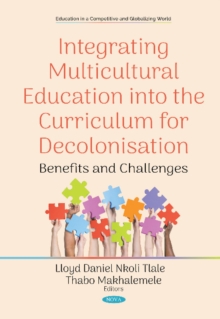Chapter One focuses on the strategies that can be used in the process of an integrated multicultural education process for a decolonised curriculum.
The specific focus in this chapter is on the debate with regard to the decolonisation of the curriculum.
Chapter Two scrutinises the realising of inclusive education in a multicultural classroom.
Managing an inclusive multicultural classroom requires teachers to have knowledge and skills based on the understanding of learning as a human right.
Chapter Three argues that when an education system lacks a multicultural education policy and implementation strategies, it becomes difficult to think of equity, redress and inclusion for all students.
Chapter Four describes multicultural education as a response to socio-economic transformation.
Here, educational transformation and decolonisation is viewed as a process towards achieving equal opportunity and equity among all citizens.
Chapter Five explores multiculturalism through transformative teaching and learning approaches and it highlights the importance of decolonising teaching and learning practices.
Chapter Six reflects on managing racial conflicts in hybrid multicultural classrooms and it is argued that conflict in multicultural schools is synonymous with overt behaviours, manifesting covertly and subtly. Chapter Seven looks at the changes in teacher preparation for multicultural classrooms.
This chapter showed that the changes in teacher preparation in both pre-service and in-service teachers are essential in preparing teachers to effectively teach in multicultural classrooms.
Chapter Eight adds to the discourse on multicultural education by advocating that the curriculum be decolonised to make it useful and by relating this idea to multicultural competence and equity pedagogy.
Chapter Nine supports the premise that students can learn better in a diverse educational environment and likewise, that exposure to diversity develops and supports a more active and engaged thinking process.
Chapter Ten ponders the development of meaningful relationships with students in a multicultural classroom and how it is a prerequisite for successful teaching and learning.
Chapter Eleven declares that a decolonising process is need to transform the curriculum to an inclusive one, to include the history, language, culture and contribution of the indigenous people.
Chapter Twelve avows that the decolonising of the educational system in multicultural classes empowers students to become independent with regards to acquisition of knowledge, skills, values, beliefs and habits, successively, enhancing the wellness of students in a multicultural environment.
Chapter Thirteen shows the importance of multicultural education in early childhood education and its implications for learning.
As part of their socialisation, learners develop their self-identity by comparing their own selves with others.
They learn that they belong to certain groups and not to others due to certain visible similarities and differences.
Chapter Fourteen asserts that multicultural education is a movement designed to empower all students to become knowledgeable, caring, and active citizens.
Chapter Fifteen maintains that multiculturalism and diversity value the uniqueness of each individual and embrace both human diversity and its camaraderie.
Chapter Sixteen expounds that discipline in multicultural classrooms can be maintained by building a classroom environment where team building and problem solving skills are expected, taught and reinforced.


